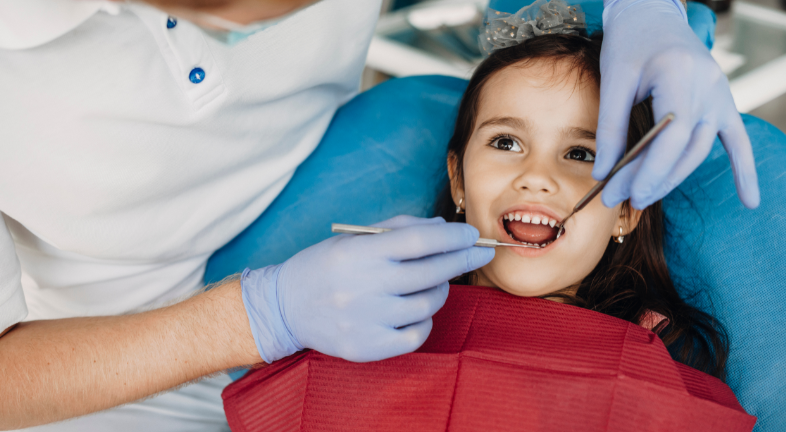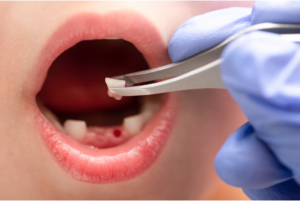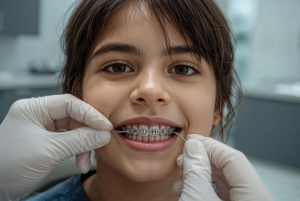
When it comes to kids' dental care, it’s all about starting strong and staying consistent. The habits your child builds now - from brushing twice a day to visiting the dentist regularly - shape their smile for life.
Even though baby teeth fall out, they play a big role in speech, chewing, and guiding adult teeth into place. Ignoring early dental problems can lead to bigger issues later, like crooked teeth, decay, or gum trouble in the teenage years.
That’s why children’s dental care isn’t just about clean teeth - it’s about prevention, confidence, and comfort. Whether it’s their first check-up or their first set of braces, early care saves stress (and money) down the road.
If you’ve ever worried about bad teeth in kids or wondered when to start pediatric dental care, this guide walks you through it all - from daily habits to treatment options and what it all costs in the UK.
Good dental care for kids isn’t just about avoiding cavities. It’s about teaching healthy habits early, building comfort around dental visits, and preventing long-term problems before they even start.
When children see a dentist for kids regularly, any small issue - like a bit of plaque buildup or a tiny cavity - can be treated early without pain or panic. It also helps them understand that dentists aren’t scary; they’re part of keeping your mouth healthy.
Here’s why it matters so much:
If you’re noticing signs of bad teeth in kids, like discolouration, sensitivity, or swollen gums, it’s not too late. Regular checkups and early treatments make a big difference.

Even with good brushing, kids and teens can still run into a few dental hiccups. Growing mouths, new teeth, and changing diets all play a part. Here’s what parents should keep an eye out for:
This is the big one. Sugary snacks, juice, and not brushing long enough can lead to decay fast. The tricky part? Early cavities don’t always hurt - which is why regular checkups are key for children’s dental care.
Bleeding gums or bad breath might mean early gum disease. Teenagers, especially those with braces, often struggle with plaque buildup that can irritate the gums.
As adult teeth come in, some kids’ jaws don’t have enough space - leading to crooked or overlapping teeth. It’s common and treatable. Pediatric dental care often includes monitoring jaw growth and suggesting aligners or braces when needed.
If your child complains of pain with cold drinks or brushing, enamel wear or minor decay might be the cause. Sensitive toothpaste or fluoride treatment can help.
Kids play rough, and accidents happen - whether it’s a chipped back tooth from sports or a fall at the playground. That’s where kids’ emergency dental treatment comes in. Having a trusted dentist who handles emergencies quickly can prevent long-term damage.
Getting kids into good dental habits early makes all the difference later on. At this age, it’s not just about brushing - it’s about building a routine that sticks.
Most kids don’t get it right at first. Help them brush twice a day with a pea-sized amount of fluoride toothpaste. Make it fun - play a short song or use a brushing app so it doesn’t feel like a chore.
As soon as two teeth touch, it’s time to floss. It might sound early, but this is where most bad teeth in kids start - between the teeth where the brush can’t reach.
Sticky sweets, fruit snacks, and juice boxes are cavity magnets. Save them for mealtime and encourage water between meals.
A dentist for kids should see your child every six months. These visits catch problems early and help your child get used to the dentist, so appointments are stress-free later on.
Your child’s dentist might suggest sealants - thin coatings that protect molars from decay. Fluoride strengthens enamel and helps prevent cavities.
Kids copy what they see. Brush together. Show them it’s just part of everyday life, not something to dread.

Teenagers are usually more independent, but that doesn’t mean they always keep up with brushing or dental visits. Between braces, busy schedules, and snacking habits, dental care for teenagers needs extra attention.
Even if they’re old enough to handle it themselves, remind them to brush twice a day and floss daily. Late-night snacking, energy drinks, and skipping flossing are what lead to bad teeth in kids and teens.
If your teen has braces, it’s easy for food to get stuck and cause plaque buildup. Orthodontic brushes and water flossers help a lot.
If they’re using clear aligners (like Caspersmile ), remind them to rinse trays regularly and brush after meals before putting them back in. Aligners are great for pediatric dental care during teenage years - they’re discreet and easier to clean than metal braces.
Late teens often start noticing wisdom teeth coming in. Regular check-ups help spot crowding or pain early, so extraction (if needed) is simpler.
If your teen plays sports, a mouthguard is non-negotiable. One hit to the mouth can cause broken brackets or chipped teeth - and those aren’t cheap fixes.
Teen habits can have long-term effects. Smoking, vaping, and sugary drinks weaken enamel and stain teeth fast. Encourage healthier choices before bad habits stick.
Most orthodontic evaluations start around ages 11–14, when permanent teeth are in and the jaw is still growing. It’s the perfect time to guide teeth into alignment before crowding or bite issues get worse.
When it comes to dental care for teenagers, early treatment isn’t just about a straighter smile - it helps with chewing, speech, and long-term oral health too. Plus, confidence during those teenage years? That matters just as much.
Metal braces are the classic choice — strong, reliable, and ideal for more complex alignment issues. For children in England, these are often free on the NHS if the treatment is considered clinically necessary (based on the IOTN score). If your child doesn’t qualify, private treatment usually costs £1,500–£3,000, with treatment lasting around 18–24 months.
Ceramic braces work the same way but are designed to blend in with natural teeth — perfect for older teens who want something more subtle. They aren’t covered by the NHS and typically cost £2,000–£6,000, depending on the complexity and length of treatment.
Then there are clear aligners for kids . They’re smooth, removable, and almost invisible — a great option for mild to moderate misalignments that don’t qualify for NHS braces. Expect prices between £1,800–£4,000, with an average treatment time of 6–18 months.
If you’re unsure whether your child qualifies for free NHS braces, your dentist can refer you for an orthodontic assessment — they’ll check your child’s bite and alignment to determine eligibility.
The cost for dental care for children in England varies depending on whether you go private or use NHS services.
For children under 18 (or under 19 and in full-time education), NHS dental care is free — including check-ups, cleanings, fillings, and extractions.
Here’s a quick breakdown of kids’ dental care costs in the UK (average private clinic prices):
| Treatment | What It’s For | Average Cost (UK) |
|---|---|---|
| Routine Check-up | Basic exam and consultation | £20–£120 |
| Kids Dental Cleaning | Professional plaque removal | £60–£90+ |
| Filling | Small to moderate cavities | £90–£180+ (size dependent) |
| Fluoride Treatment | Strengthens enamel and prevents decay | Free (With NHS) £30–£100 (Privately) |
| Sealants | Protective coating for molars | £30–£50 per tooth |
| Emergency Visit | For pain, injury, or swelling | £75–£150 |
| Braces / Clear Aligners | Straightening misaligned teeth | £1,500–£4,000+ |
These are just ballpark figures - kids' dental cleaning costs and other treatments might be cheaper with NHS coverage or family dental plans.
Private care, however, comes with its own price range. The prices can vary depending on your clinic and location. Some private practices offer family or membership plans that reduce ongoing costs, especially for routine visits.
The best strategy is prevention - regular dental check-ups, two cleanings a year, and orthodontic assessments from around age 7–9. Catching small problems early keeps your child’s smile healthy, confident, and wallet-friendly in the long run.
Here’s a detailed comparison between braces and invisible aligners to give you a better idea.
Good dental care for children starts at home - and kids learn best by watching you.
When oral hygiene becomes part of your family’s daily rhythm, it sticks for life.
Turn brushing and flossing into a family activity. Kids love to copy, so when they see you brushing twice a day and rinsing after meals, they’ll follow along naturally. Make it fun - play their favorite song or set a two-minute timer to keep everyone on track.
Routine visits to the dentist for kids every six months help spot small issues before they become big ones. It’s also a great way to teach your child that going to the dentist is normal, not scary.
You don’t have to hand out sweets as a reward - a sticker chart or extra bedtime story works just as well. Praise effort and consistency rather than “perfect” brushing. It builds habits without pressure.
As kids grow, so does their independence - and that means you’ll need to remind them why oral care matters.
Talk about real-life consequences:
Healthy habits built young don’t just protect smiles - they build confidence, too.
Besides that, here are 7 more ways to improve your child's dental health .
When it comes to dental care for children and teenagers, the earlier you start, the easier it is to keep smiles strong for life.
From baby teeth to braces and beyond, every stage plays a role in shaping healthy habits and confident smiles.
Good oral care isn’t just about preventing cavities - it’s about teaching responsibility, boosting confidence, and protecting overall health.
A quick checkup every six months and a few minutes of brushing each day can save years of dental trouble later on.
Whether it’s your toddler learning to brush or your teen adjusting to orthodontic treatment, small daily habits make a big difference.






Curated the best for your knowledge
Trench mouth, or necrotising ulcerative gingivitis, is an extremely painful and fast-developing form of gum disease. People with trench mouth often experience severe gum swelling and persistent bad breath, yet many are unaware that these symptoms point to a serious underlying oral health condition. Unless treated properly, trench mouth can worsen to the point of creating irreparable damage.
Read MoreCleaning your night guard isn’t just about keeping it looking clear. It directly affects your oral health, breath, comfort, and how long the guard lasts. A poorly cleaned night guard can quickly become unhygienic, uncomfortable, and even harmful to your gums and teeth.
Read More.webp) Can You Make a New Retainer from an Old One
Can You Make a New Retainer from an Old OneFinally, you have completed your orthodontic journey. Your braces are removed, your teeth have been straightened, and the months of wearing rubber bands, tightening, and using aligners have worked. You look in the mirror, take a deep breath, and smile; your teeth look great! But then your heart starts racing when you open your retainer case and realize it’s gone. Or even worse, your retainer is either broken, warped, or discolored.
Read MoreQuick Links

Heading